|
Hello from Japan! (日本からこんにちは!)
|
 「グローバリゼーション」「国際化」「児童英語(キッズイングリッシュ)」-- 最近よく耳にする言葉ですが、世界を見てみると、小学生から英語を教え始める国が増え始めました。特にここ数年の動きで目立つは東アジア。お隣の国々では既に公立の小学校で英語教育を取り入れています。さて、日本は? というと、まだその議論の真最中なのです。
「グローバリゼーション」「国際化」「児童英語(キッズイングリッシュ)」-- 最近よく耳にする言葉ですが、世界を見てみると、小学生から英語を教え始める国が増え始めました。特にここ数年の動きで目立つは東アジア。お隣の国々では既に公立の小学校で英語教育を取り入れています。さて、日本は? というと、まだその議論の真最中なのです。
そんな中、日本に住む私達にとって、気になること — それは、「海の向こうではどんな『キッズイングリッシュ』が展開されているのか」ということではないでしょうか? また、日本の英語教育について、世界の人たちがどんなふうに思っているのか、聞いてみたいと思いませんか?
|
|
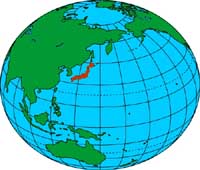
|
第一回目の今回は、
日本の小学生にスポットライトを当てます。 |
|
 今月から始まるこのコーナーでは、毎月いろいろな国の小学生を紹介するとともに、その国の英語教育の実態を探っていきます。
あわせて、そこに潜んでいる文化的背景も紹介します。初回は、日本の典型的な小学生の生活をご紹介します。
今月から始まるこのコーナーでは、毎月いろいろな国の小学生を紹介するとともに、その国の英語教育の実態を探っていきます。
あわせて、そこに潜んでいる文化的背景も紹介します。初回は、日本の典型的な小学生の生活をご紹介します。
■PART 1
今日のお友だち: 日本の冠君(10歳)とリサちゃん(10歳)
Today's friends are Kan and Lisa — both of them are 10 years old.
|

 家族
家族
my family. |
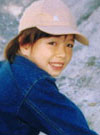 |

 弁護士か
弁護士か
専業主婦
to be a lawyer or
a housewife.
|

 友だちとはいつもたまごっちで通信しているよ。
友だちとはいつもたまごっちで通信しているよ。
I'm always e-mailing, using tamagotchi.
|

 体育
体育
physical education.
ダンスをしたり体を動かすことが好き♪
I love dancing.
|
|
● 日本の公立の小学校は、
こんな感じです。
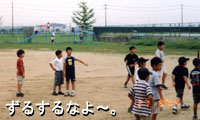 「大好きな公園です」
「大好きな公園です」
(This is my favorite park.)
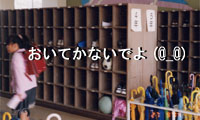 「下駄箱です。あれ?サッカーボール入れになってる?」
「下駄箱です。あれ?サッカーボール入れになってる?」
(This is our shoe box. Huh? A soccer ball in a shoe box?)
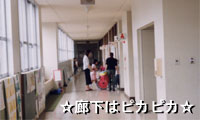 「廊下はこんな感じです。毎日ぞうきんがけしてるからきれいでしょ?」
「廊下はこんな感じです。毎日ぞうきんがけしてるからきれいでしょ?」
(This is a corridor. We clean it every day with a wet rag. Look how clean the floor is.)
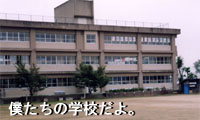
校舎
(Typical Japanese elementary school)
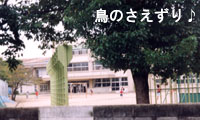 校庭
校庭
(Every morning, we enjoy listening to the birds sing.)
|
|
■PART 2
公立の小学校に通う冠君のある一日
A typical day for Kan(^o^)丿

| TIME |
WHAT I DO |
COMMENTS
|
| 7:30- |
起床&朝食
(breakfast) |
朝は納豆と味噌汁だよ。
I eat miso soup and natto every morning.
|
|
8:10-8:25 |
登校
(walking to the school)
|
友だちと登校するよ。
I walk to school with my friends. |
|
8:30-8:45
|
朝礼
(morning assembly) |
まだ眠いなぁ(-_- 。
I am still sleepy around this time. |
|
8:45-9:30
|
道徳
(ethics)
|
広島の貞子ちゃんのお話を読んだよ。
I learned about the atomic bomb in Hiroshima. |
|
9:35-10:20 |
音楽
(music) |
太鼓を習ったよ。
I learned to play Japanese drums. |
|
10:40-11:25 |
算数
(math) |
分数を習ったよ。
I learned about fractions. |
|
11:30-12:15
|
※チャレンジ
(challenge) |
アメリカ人がきた! 初めて英語にチャレンジしてみたよ。
Wow! An American came to our school today and taught us English! It was the first time I tried challenging English!
|
|
12:15-12:55
|
給食
(lunch time) |
日本の小学校の給食は、とても国際的。韓国料理とイタリア料理が好き。何でも食べられるよ。
School lunch in Japan can be quite international.
My favorite food is Korean and Italian.
|
| 13:15-13:35 |
掃除
(cleaning time) |
生徒が掃除をしない国もあるよね。
There are countries where students do not have to clean the class rooms that they use.
|
|
13:35-14:20 |
国語
(Japanese) |
国語は僕の得意科目。
Japanese is my favorite subject. |
| 14:25-15:10 |
体育
(Physical education) |
跳び箱が飛べるようになったよ(^○^)。
I can now jump the vaulting box. |
|
15:50-
|
放課後
(after school) |
僕は塾に行くよ。
国語と算数を習っているんだ。
I go to cram school to study Japanese and math.
|
※注釈
(Note) |
|
☆★2004年10月現在、英語は公立の小学校ではまだ
必須科目に含まれていません。
ただ、「総合的な学習の時間」などを利用して
英語に触れることはできます。
冠君もこれまでたった一度ですが、「チャレンジ」の時間で
アメリカ人から英語を教わる機会がありました。
As of October 2004, English is not a compulsory subject at public elementary schools in Japan.
But it can be taught as an "extra" subject.
As you can see, Kan had the opportunity to learn English from an American — although he's only had one chance so far this year.
☆★英語を小学校で教えることが議論され始めたのは1990年代に入ってから。
賛否両論の議論が続いていますが、今後どのように展開していくのか
注目されています。
On the issue of English education in elementary schools, Japan is currently at a crossroads.
There are many different opinions on the matter, and so far no compromise has been reached.
Where English education will go from here will remain to be seen.
|
|
|
■PART 3
ニッポンの子供がつまづきやすい英語のなぜ? なに?
What are the difficulties that Japanese kids face when learning English?
(Photo & Illustration Courtesy of "BUNEIDO")
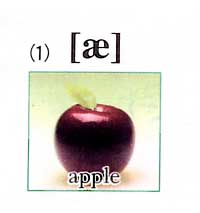 |
|
●発音(pronunciation)
☆★頭の切り替えが必要
(From romaji to English)☆★
ローマ字では"Mike"は「ミケ」と発音するのに、英語だと「マイク」って発音しなきゃならないんだね。
頭を切り替えるのが大変だぁ。(>_<)
In romaji, which we learn at elementary school, "Mike" should be pronounced "mi-ke" — not "mike" as it is pronounced in English. It can be very confusing for us.
☆★カタカナじゃだめ?☆★
発音記号を 覚えるのも大変。
だから代わりにカタカナで覚えようとしちゃうんだ。
それで先生に怒られちゃうときもある。
It's not easy to remember phonetic symbols.
So I tend to write katakana next to each English word to remember how to pronounce it.
Sometimes the teacher gets angry at me for doing that.
|
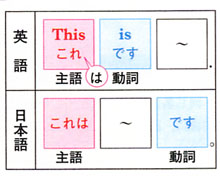 |
|
●語順
(word order)
☆★「は」はどこに行くのさ?☆★
英語と日本語は語順がまるっきり違う。
日本語では動詞が最後にくるけど、英語では2番目にくる。
じゃあ 日本語の「は」はどこに消えちゃうの? 先生は無理やり暗記しろっていうけど疑問は頭ん中に残ったままだよ。(*_*)
Word order in Japanese and English is completely different.
In Japanese, the verb comes at the end of the sentence. In English, it comes in the middle.
And where does the "ha" particle go when you translate Japanese into English?
My teacher just says, "Don't think about it. Just memorize the sentence as it is." But I can't stop wondering where that particle has gone.
|
 |
●文法関連
☆★文法用語☆★
(Grammatical terms)
is が複数になるとareになり、a book は booksになり、
he,she, it は they になる。これ覚えるのもひと苦労なのに、
さらに「単数」だとか「複数」だとか文法用語を覚えなきゃならない。
(-_-;)
It's hard enough to learn English grammatical terms in Japanese, but of course you also have to study the actual grammer itself.
☆★主語によって「です」が変わる( three 'desu' in English)☆★
慣れてる大人たちにとっては当たり前のことかも
しれないけれど、僕たちにはびっくり仰天だよ。
Depending on the subject, you need to change the verb
'is' , 'are' or 'am'.(@_@)
|
■PART3 — その2
ニッポンの大人がつまづきやすい 英語のなぜ?なに?
Where are Japanese adults' weak points when it comes to English?
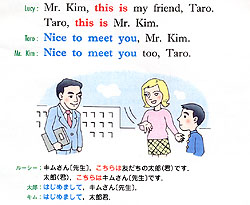 |
|
●
No? それとも Yes?
("No?" or "Yes?")
Lisa:You didn't know about that?
(あのこと知らなかったでしょ?)
Kan:No, I didn't.(○)
(ううん、知らなかったよ)
Kan:Yes, I didn't.(×)
(うん、知らなかったよ)
|
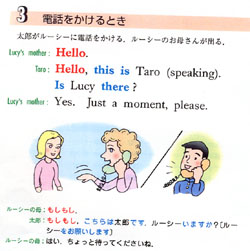 |
|
●come と go
(come & go)
(相手の自宅へ「今行きます」と伝える会話)
I am coming to your house now.(○)
(直訳すると、「今、あなたのおうちへ来ます」)
I am going to your house now.(×)
(日本語の感覚で言うと、「今、あなたのおうちへ行きます」)
|
|
■PART 4
日本の公立の小学校についての基本データ
General Infomation on Public Elementary Schools in Japan
★クラスの生徒数
☆How many students are there in a class?
|
30-40人
About 30-40 |
Kan:
僕のクラスは35人だよ。
There are 35 pupils in my class. |
★英語は何歳からはじめるの?
☆When do you start learning English? |
12歳(中学1年生)
At the age of 12 |
Kan:
あと2年だ!
I have to study English in 2 years time!
|
★政府は小学校での英語教育を奨励している?
☆Is English education encouraged from an early age? |
賛否両論。やるとしてもあと5年はかかりそう。
Yes and no. Even it were to become part of the curriculum, it wouldn't be for another 5 years or so.
|
Kan:
僕はどっちでもいいよ。国語が好きだから英語も好きになれるかも!
I don't care. But I might like English, because I like learning languages.
|
★それで、中学校での英語の授業は週何時間あるの?
☆On average, how many hours each week do junior high school students study English? |
平均3時間
About 3 hours per week |
Kan:
3時間って短いのかな、長いのかな・・(~_~)
Three hours? Isn't that really long... ?
|
|
 |
 |
★日本では、みんな英語教育に興味はあるの?
☆Are most people in Japan interested in English? |
概してある。
Yes! |
Kan:
ママもいっぱいあるっていってたよ。
My mom also told me "YES!" |
★英語の塾はあるの?
☆Are there many English cram schools in Japan? |
ある!たーくさんある。
Yes, many! |
Kan:
特に女の子に人気があるよ。
Yes, and it's something that's popular with girls.
|
★英語の先生はネイティブ?
☆Are the English teachers native speakers? |
基本的に日本人だが学校によってはALTがいる。
Generally, they aren't, but there are sometimes native speakers working as ALT, depending
on the school and the area.
*ALTとはAssistant Learning Teacher
=外国語指導助手
|
Kan:
アメリカとかオーストラリアとか、英語を話す国からきた先生もいるんだって。
I heard that there are teachers from English-speaking countries, such as the United States or Australia. |
★外国人の生徒や移民はいるの?
☆Are there foreign students? If so, where are they from? |
地域にもよるけど 全国的にあまりいない。
It depends on the area, but there aren't that many in Japan. |
Kan:
僕も外国人のお友だちはいないし、移民の子はクラスに一人もいないよ。
I don't have foreign friends. There aren't any foreigners in my class. |
★先生はどんな服装で教えてるの?
☆What kind of clothes does your teacher wear at school? |
カジュアル。動きやすい服装。
Very casual. |
Kan:
トレパンとか、とっても楽チンな服装だよ。
Sweat pants, or something easy-to-wear like that. |
★識字率を教えて!
☆What is Japan's literacy rate? |
99.8%です。
It's 99.8% |
Kan:
日本はとても高いんだね。
It's very high here in Japan.
|
|
■PART 5
人々の声
Vox populi
 外国人がみた日本の英語教育
外国人がみた日本の英語教育
ロシア人のナターシャさん。現在日本の大学に留学中。
(Natasha is from Russia. She is studying at a university in Japan.)
彼女から見た日本の英語教育は?(Let's see her comment on English education in Japan)
|

|
「ちっともよくないと思う。だって先生は文法やら単語やらを生徒にたたきこむ感じで、生徒は
訳わからないままに勉強させられているから」
"It's not good at all. Teachers just force feed students with grammar and vocabulary that
doesn't make sense to kids."
|
|
 小学生のママからみた日本の英語教育I 小学生のママからみた日本の英語教育I
冠には英語を使える人になってほしいという彼女から見た日本の英語教育は?
|

|
「冠の母です。冠は小学校4年生。この年ごろになるとほとんどの子が受験の準備で塾に通っているんです。英語どころではありません。本当にやらせたいのなら低学年からやらせるべきだと思います。私が英語で苦労しているので、冠には是非しゃべれるようになってほしいなぁと思います。どうしたらいいんでしょうね?」
"Hi, I'm Kan's mom. Kan is in the fourth grade of elementary school. I think the kids just don't have time to learn English properly. Most of them are too busy going to cram schools and preparing for entrance exams for junior high schools. I want him to be a good English speaker, but I have no idea at the moment how to go about it. Do YOU have any ideas?"
|
|
 小学生のママからみた日本の英語教育 II 小学生のママからみた日本の英語教育 II
英語とは、日本語を話さない人たちとのコミュニケーションを図る「大切な道具」だと思う彼女の意見は?
|

|
「リサはハーフです。生まれてまもなく日本にきたので、リサが唯一しゃべれる英語は「マミー」ぐらいになってしまったことも
ありました。(-_-;) 日本の公立の小学校では英語は習えないので、バイリンガルで授業を進める私立へ通わせています。
日本の英語教育?残念ながら、使える英語が身に付かないですね。それに日本で英語を習おうとするとどうしてこんなにお金がかかるのでしょう。国がそういうところにこそ、もっとお金を使ってほしい。そして質の高い授業をしてほしい。そのためには、『誰』が教えるかが重要なポイントだと思います。」
"Hi, I am Lisa's mum. We came back to Japan soon after she was born, so there was time when she could only remember how to say "Mummy!" As there's no chance for her to learn English at public elementary schools, I decided to send her to a private school where she can study in English and in Japanese.
English education in Japan isn't practical at all. It costs too much.
The Japanese government should spend more money on good-quality English education. I think the most important issue is "who" will teach at a school. If the teachers aren't any good, I don't think it's worth doing."
|
|
 小学生のパパからみた日本の英語教育
小学生のパパからみた日本の英語教育
ユウタ君のパパ。仕事柄英語を使う彼から見た日本の英語教育は?
|
「息子は小学校4年生です。英語は3歳のときから習わせています。
きっかけは当時通っていた幼児教室の次にあった習い事が英語で、オーストラリアからきた先生がとても面白かったからです。
息子から『習いたい』って言い始めたんですよ。今では 結構話せると思うんですけど僕の前では話したがらないですねえ。
でも、本人が好きでやっていることだからこれからも習わせたいと思います。
小学生の英語教育?いいと思いますよ。小学生のうちは会話を、中学生から文法をやればいいんじゃないですか?」
"Hi, my son is 10 years old and in the fourth grade of elementary school.
He began studying English when he was 3 years old.
He used to go to a nursery school, and after that he would go to English classes with an Australian teacher, which he really enjoyed.
I think his English is quite good now, but he doesn't like to speak English in front of me.
But he likes English, and so I like to help him learn.
I think the best thing for learning English is to start learning how to communicate in English at an early age. The kids can start learning grammar when they get to junior high school.
|
■PART 6
日本の教育制度
Japanese education system

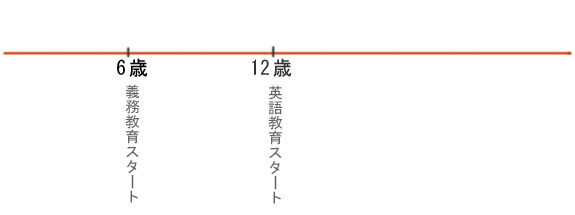
 日本では、義務教育は6歳から15歳までとなっています。
日本では、義務教育は6歳から15歳までとなっています。
At the age of six, every Japanese person goes to elementary school.
It's required by law that all children go to the school between the age of six and 15.
この義務教育のシステムは1872年に定められました。
This education system was established in 1872.
 英語は中学生になると - つまり12歳から- 3年間習います。
英語は中学生になると - つまり12歳から- 3年間習います。
Students are required to study three years of English in junior high school. Children normally start junior high when they are 12.
■PART 7
日本の子どもの1年間
A typical year for a Japanese kid

| 4月(April) |
5月(May) |
6月(June) |
7月(July) |
入学式、
新学期始まる
(Entrance ceremony)
The randoseru, which came from a Dutch word, is a kid's schoolbag.)

|
登校風景
(Walking to school)
Guess what the white box is. It's a lunchbox. My mum made the food.
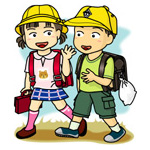
|
梅雨の始まり
(Tsuyu — rainy season) |
夏休み♪
(衣替えの季節ですね。)
(Summer vacation is drawing on closer!)
Summer comes at the end of the rainy season!
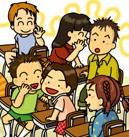
|
| 8月(August) |
9月(September) |
10月(October) |
11月(November) |
夏休み
(Summer vacation, natsuyasumi --
so many things to do, including homework! )

|
2学期始まる
(Beginning of the term,shingakki) |
運動会
(Undokai — Sports Day)
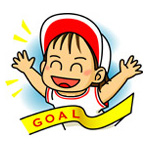
|
修学旅行
(School excursion) |
| 12月(December) |
1月(January) |
2月(February) |
3月(March) |
大掃除
(Osoji — "cleaning up the house and classrooms.")
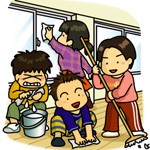
|
お正月、
3学期始まる
(Oshogatsu- New Year and the beginning of the next term, shingakki) |
バレンタインデー
Valentine's day
(The Japanese girls express their love by giving chocolates to someone special on this day.)

|
卒業式
(Sotsugyoshiki-- graduation ceremony)
'Auld Lang Syne" is this day's song.

|
|
|
